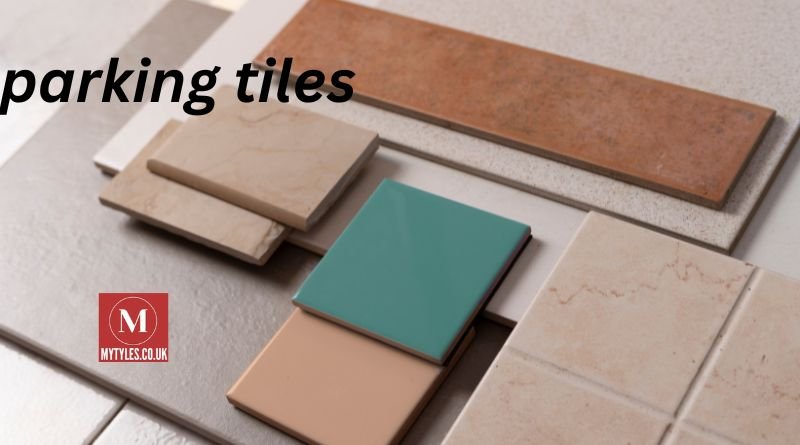Parking tiles are a specialized type of flooring used in outdoor areas, specifically designed for parking lots, driveways, garages, and other spaces subjected to heavy traffic and load-bearing vehicles. In addition to their functional benefits, parking tiles also contribute to the aesthetic value of these spaces. In this article, we will explore the world of parking tiles, their types, benefits, installation processes, and tips for choosing the right tiles for your space.
What are Parking Tiles?
Parking tiles are robust, durable tiles designed to withstand the pressure and wear caused by vehicles. These tiles are typically used in parking areas, driveways, and outdoor spaces that need a strong, non-slip surface capable of handling the weight of cars, bikes, and other vehicles. Made from a variety of materials such as ceramic, vitrified, or cement, parking tiles offer a high level of strength and durability that ordinary tiles cannot provide.
The primary goal of using parking tiles is to ensure the longevity of the parking area while enhancing its visual appeal. Unlike regular outdoor surfaces like concrete or asphalt, parking tiles come in a variety of designs and finishes, which allows homeowners, architects, and builders to create visually appealing parking spaces. In addition to their strength and durability, these tiles also provide skid resistance, ensuring safe usage in wet or slippery conditions.
Types of Parking Tiles
Parking tiles are available in various materials and finishes, each designed to serve specific purposes based on environmental and usage requirements. Here are the most common types of parking tiles:
1. Vitrified Parking Tiles
Vitrified tiles are one of the most popular choices for parking areas. These tiles are made by vitrifying clay, which creates a dense and non-porous material. This type of tile is known for its strength, low porosity, and resistance to stains and water absorption, making it ideal for outdoor usage. Vitrified tiles come in a wide range of colors, patterns, and textures, allowing for customized designs to suit any aesthetic.
2. Porcelain Parking Tiles
Porcelain tiles are another popular option due to their ability to withstand heavy loads and extreme weather conditions. These tiles are typically thicker than regular ceramic tiles and have a low water absorption rate, making them suitable for areas exposed to moisture and rain. Porcelain parking tiles also come in slip-resistant finishes, which enhances safety in wet conditions.
3. Interlocking Concrete Tiles
Concrete interlocking tiles are a cost-effective and durable solution for parking spaces. These tiles are made from cement and are designed to interlock, creating a stable and strong surface. Concrete parking tiles are available in different shapes and sizes, providing flexibility in design. Their high strength makes them ideal for commercial parking lots, driveways, and public areas with heavy traffic.
4. Cement Parking Tiles
Cement tiles, also known as encaustic cement tiles, are handmade tiles that provide a more traditional and rustic look. They are highly durable and resistant to weather and wear, making them a suitable choice for outdoor parking areas. However, cement tiles require regular sealing and maintenance to prevent staining and water absorption.
5. Granite Parking Tiles
Granite is a natural stone material known for its exceptional durability and resistance to wear and tear. Granite tiles are often used in premium parking areas or high-end residential projects due to their elegant appearance and high performance. While they can be more expensive than other materials, granite tiles are highly resistant to cracking, chipping, and environmental factors, making them a long-lasting solution.
Benefits of Parking Tiles
Parking tiles offer a number of advantages over traditional paving materials like asphalt or plain concrete. Some of the key benefits include:
1. Durability and Strength
Parking tiles are designed to bear the weight of vehicles without cracking or breaking. This makes them more durable than regular outdoor tiles or paving stones. High-quality parking tiles can withstand heavy loads, high traffic, and the wear caused by the movement of cars, trucks, and bikes.
2. Aesthetic Appeal
One of the biggest advantages of parking tiles is the wide variety of designs, colors, and textures available. Unlike concrete or asphalt, parking tiles can be used to create unique and visually appealing parking spaces. From modern geometric patterns to classic stone-like finishes, parking tiles offer endless possibilities for customization, enhancing the overall look of outdoor spaces.
3. Slip-Resistant and Safe
Safety is a key consideration for any parking space, and parking tiles are designed to provide excellent traction. Many parking tiles come with anti-skid or slip-resistant surfaces, which help prevent accidents in wet or icy conditions. This is especially important in regions with heavy rainfall or snow, where slippery surfaces can be hazardous.
4. Easy Maintenance
Parking tiles are relatively easy to clean and maintain compared to other outdoor surfaces. They are resistant to stains and dirt, and in case of damage, individual tiles can be easily replaced without disturbing the entire area. Regular sweeping and occasional pressure washing are generally sufficient to keep parking tiles in good condition.
5. Weather Resistance
Parking tiles are built to withstand harsh weather conditions. Whether exposed to extreme heat, cold, or heavy rainfall, these tiles maintain their structural integrity and color over time. Vitrified and porcelain tiles, in particular, have low water absorption rates, making them resistant to frost and water-related damage.
Installation Process of Parking Tiles
The installation of parking tiles requires careful planning and execution to ensure a durable and long-lasting result. Here are the general steps involved in the installation process:
1. Preparation of the Base
The first step in the installation process is to prepare the base where the tiles will be laid. This involves clearing the area of any debris, stones, or existing surfaces. The ground is then leveled, and a base layer of compacted gravel or sand is added to provide a stable foundation for the tiles.
2. Laying the Tiles
Once the base is prepared, the tiles are carefully arranged in the desired pattern. For interlocking tiles, the pieces are placed in a way that allows them to lock into each other, creating a stable surface. The alignment and spacing between the tiles must be precise to avoid uneven surfaces.
3. Grouting and Sealing
After the tiles are laid, grout is applied to fill in the gaps between the tiles. This helps prevent movement and provides a smooth finish. For certain types of tiles, such as cement or granite, a sealant may be applied to protect the tiles from staining and moisture absorption.
4. Finishing Touches
Finally, the parking area is cleaned, and any excess grout or debris is removed. The finished surface is checked for any irregularities, and adjustments are made if necessary. Once the installation is complete, the area is ready for use.
How to Choose the Right Parking Tiles
When selecting parking tiles for your project, several factors need to be considered to ensure the best results:
1. Load-Bearing Capacity
The primary function of parking tiles is to support the weight of vehicles. Therefore, it’s essential to choose tiles with sufficient strength and thickness to handle the load of the cars that will use the area.
2. Weather Conditions
The choice of material should also take into account the local climate. For example, vitrified or porcelain tiles are more suitable for areas with heavy rainfall or frost, while cement or granite tiles may be better suited for drier regions.
3. Design and Aesthetic
Consider the overall look you want to achieve for your parking area. Parking tiles come in a variety of colors and patterns, so you can choose a design that complements the surrounding architecture or landscaping.
4. Budget
Parking tiles vary widely in price depending on the material, brand, and quality. It’s important to balance your budget with the need for durability and functionality, especially in high-traffic areas.
Conclusion
Parking tiles are an excellent choice for enhancing the functionality and appearance of parking areas, driveways, and other outdoor spaces. Their durability, ease of maintenance, and aesthetic versatility make them a superior alternative to traditional paving materials. Whether you’re planning a residential driveway or a commercial parking lot, investing in high-quality parking tiles can significantly improve the safety, performance, and visual appeal of your project.
By considering factors such as load-bearing capacity, weather conditions, design, and budget, you can choose the right type of parking tile to meet your specific needs. With proper installation and maintenance, parking tiles offer a long-lasting solution that will withstand the test of time.
Read also: check




